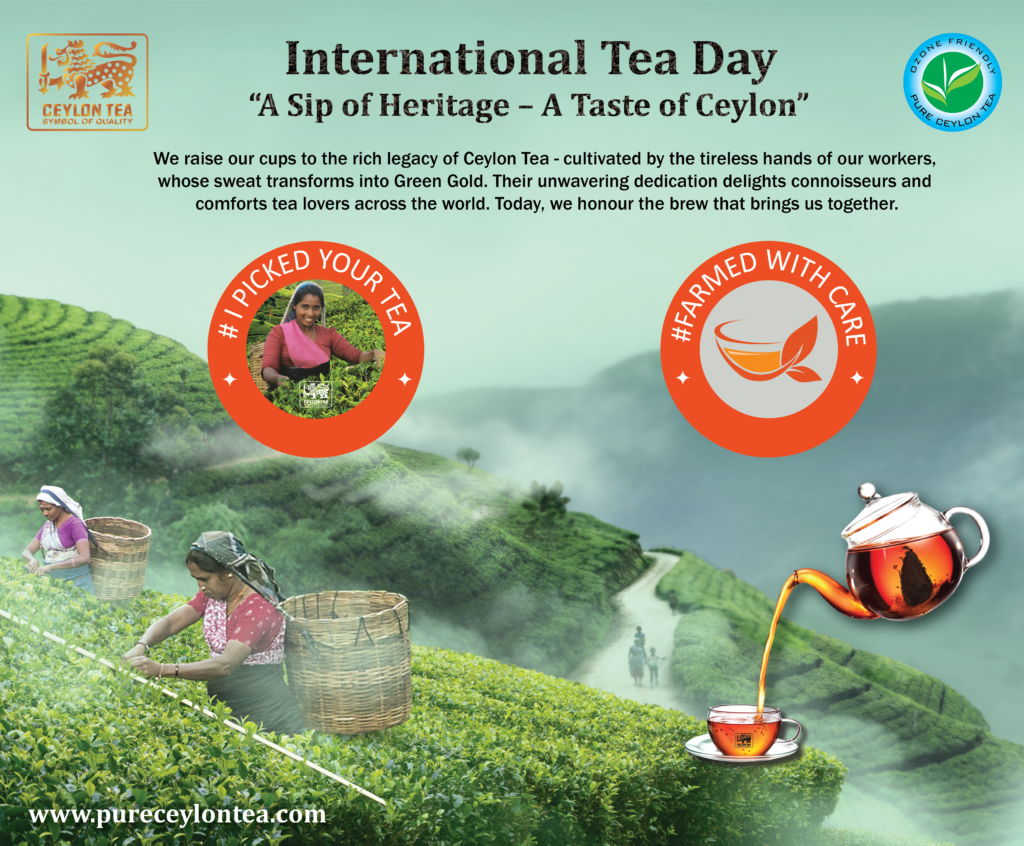


Celebration of International Tea Day – 21st May 2025
May 21, 2025
Brewing a Greener Future: Sri Lanka’s Sustainable Journey in the Tea Industry
As the world celebrates International Tea Day, Sri Lanka raises a cup to its enduring commitment to sustainable tea cultivation, innovation, and ethical practices.
International Tea Day is a United Nations observance celebrated annually on May 21 to express the economical, biological and nutritional benefits of tea. The observance of International Tea Day is promoted and facilitated by the UN Food and Agriculture Organization in collaboration with other relevant organizations and stakeholders.
illions of families in developing and least developed countries owe their livelihood and subsistence to tea. Some of the poorest countries rely on the tea industry as a key source of livelihood being a labor-intensive sector, it is an important provider of jobs for people living in economically disadvantaged and remote areas of the tea producing regions. As one of the major perennial crops, tea plays a significant role in rural development, poverty reduction and food security.
The production and processing of tea contributes to the achievement of the sustainable development of the regions populous. Taking this into account, the UN General Assembly designated May 21 as International Tea Day based on the proposal submitted by the FAO-IGG Tea group.
The key goal of International Tea Day is to raise public awareness of the importance of tea for sustainable livelihood and rural development, as well as the challenges that the tea industry has to face, such as climate change. The observance also aims to popularize tea drinking around the world in order to expand demand and increase per capita consumption.
On this International Tea Day, Sri Lanka—home of the world-renowned Ceylon Tea and as one of the major tea producing and exporting nations—celebrates not just its heritage but its forward-looking sustainability that is reshaping the global tea narrative.
For over 150 years, Ceylon Tea is symbolized as a beverage of high quality. It also stands as a symbol of resilience to climate and environmental changes whilst symbolizing for its ethical production.
From the central highlands of NuwaraEliya to the lush estates of down south ofRuhuna, tea planters across Sri Lanka have embraced comprehensive sustainability practices that reduce carbon footprints while preserving the island’s precious biodiversity.
Many plantations are now:-
- Certified Carbon Neutral, with Sri Lanka becoming the first tea-growing country in the world to achieve this distinction.
- Implementing renewable energy solutions, including micro-hydro and solar power, in processing.
- Adopting organic farming methods and reducing agrochemical use to protect both soil health and human health.
- Reforesting buffer zones and conserving water through modern irrigation practices.
With climate change posing serious challenges to agriculture globally, Sri Lanka is leading regional research on climate-smart tea varieties that are drought and pest resistant. Collaborative initiatives between the government, research institutions, and private sector are ensuring the long-term resilience of the industry.
The tea industry provides livelihoods to over 2 million people. Women make up over 60% of the workforce. Programs in education, maternal health, and skill development are creatingbetter lives, greater equity and social development.
Worker welfare standards are also being elevated through partnerships with ethical certifiers like Fairtrade and Rainforest Alliance, ensuring that consumers around the world can enjoy their cup of Ceylon Tea with a conscience.
The role of women in production and distribution, recognizing their efforts in the industry
International Tea Day 2025, celebrated on May 21st, will focus on the role of women in tea production and distribution, recognizing their efforts in the industry, particularly in developing countries. The event aims to highlight the need to ensure that women are not exploited and to celebrate their contribution to the tea industry.
Women are an integral part in tea production and distribution, making up the majority of tea pickers and farmers. Their contribution extend beyond harvesting, including processing, quality control, and even innovation in cultivation and trade. Recognizing and empowering women in this vital sector is crucial for economic growth and gender equality.
The vast majority of tea pluckers and wage workers, both on large plantations and smallholdings, are female. This is a labor-intensive task that is crucial to the entire tea production process. Many women are also involved in smallholder tea farming, owning and managing their own plots, often with their families. They play a key role in maintaining the tea bushes, plucking leaves, and managing the entire tea-growing process.
Women in the smallholder sector are increasingly involved in intercropping, cultivating other crops to diversify income and provide a more stable livelihood.
The income generated from tea farming, especially in smallholdings, can be a significant source of income for women and their families. This income can help women become financially independent, and improve the overall economic well-being of their households.
While primarily known for their roles in production, women are also increasingly involved in the distribution and marketing of tea, contributing to the tea industry’s overall economic success.
Efforts are underway to empower women in the tea industry, providing them with access to training and leadership opportunities, allowing them to step into non-traditional roles and break through historical barriers.
Women in Sri Lanka’s tea industry are key players in the production, distribution, and economic sustainability of the sector. Their contributions are crucial to the success of the tea industry and the well-being of their families and communities.
Raising a Global Cup
As the world celebrates International Tea Day, Sri Lanka invites consumers, stakeholders, and partners to join in supporting a more sustainable and equitable tea industry. Every cup of Ceylon Tea carries the legacy of a nation committed to excellence—not just in taste, but in ethics and environmental care.
Sri Lanka Tea Board
www.pureceylontea.com

